The Wreckage of Love, Our Regard Lies White and Broken (The Last War in Albion Book Two Part Twenty-Nine: Apocalypse)
Previously in The Last War in Albion: Watchmen seemed not born so much as ground like pigment from its time; something that could only possibly have been created by Alan Moore and Dave Gibbons in 1986, at that point in their career, out of the specific interests they had at the time.
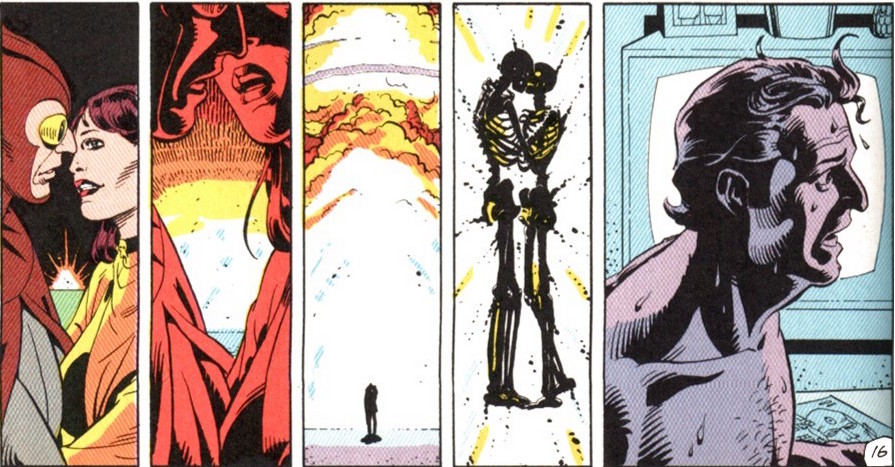 |
| Figure 947: Eroticized war in Watchmen. (Written by Alan Moore, art by Dave Gibbons and John Higgins, from Watchmen #7, 1986) |
Moore has often made the joke that Watchmen was the result of a “bad mood” that he was in during the period. This is by and large understating things. In interviews from the time, Moore seems genuinely convinced that the world is going to end, certainly during his children’s lifetime, if not during his, and probably in some sort of nuclear explosion. In one interview, for instance, he notes that “in forty years the rain forests will be gone. If the rain forests are gone, we can’t breathe. Simple as that. There’s nothing that’s more simple than that: no trees, no air. One of my children is eight. She said to me the other day, “I’ll only be forty-eight, won’t I?’ and I said. ‘Yeah’. It’s a pretty depressing thought. What a horrible thing to have to think about. I mean, we brought these children into the world and it might not have that much longer left. Nuclear reactors, for another thing. They can’t be decommissioned because nobody knows how to do it. But they keep building them. We are going to have a Chernobyl every four or five years from now on. And more, because those reactors weren’t built to last for twenty-five years in the first place; and they were built thirty years ago. One of those reactors is going to go up every few years.” Obviously this proved unduly pessimistic, although to be fair Leah’s still only thirty-eight. But nevertheless, it was the world Moore saw in 1986, and with no surprise. It was the peak of the Reagan/Thatcher years, disarmament talks were failing, Chernobyl happened. A wealth of immediate threats to human survival loomed, and the political situation looked actively disinclined to even acknowledge them; indeed, the US government seemed at times to almost eroticize the notion of nuclear war. Apocalypse felt just around the corner.
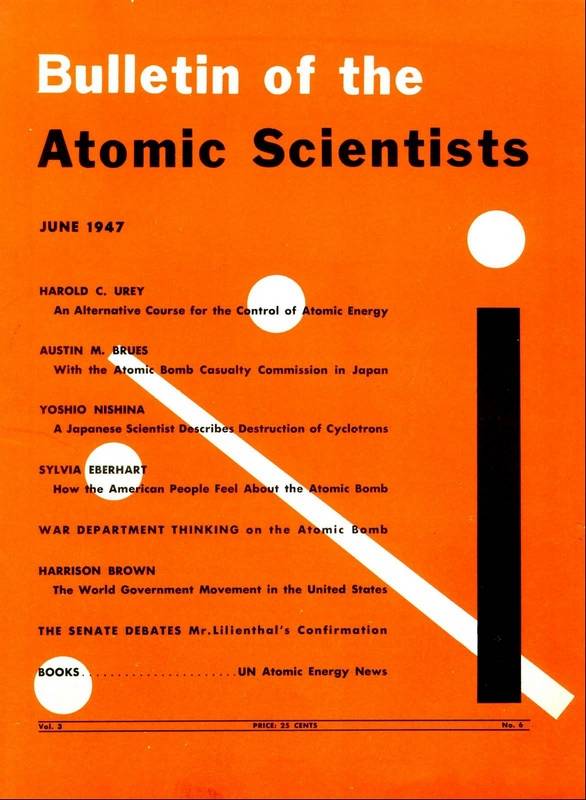 |
| Figure 948: The June, 1947 issue of Bulletin of the Atomic Sciences, introduciing the Doomsday Clock. |
It is impossible to fully understand the density of Watchmen absent this context. The point is not simply to be a comic that rewards reading and rereading at great length; the point is to be a comic with such density as to generate an inescapable gravity. Through its massively layered resonances and nonstop foreshadowing it conveys a constant sense of inevitability. This is, of course, flagged in one of the book’s most basic structural metaphors, the advancing clock on the back of every issue. This, in turn, alludes to the Doomsday Clock, a periodic feature of the Bulletin of the Atomic Sciences that declares the Bulletin’s assessment of the current danger of global disaster in the form of a clockface approaching midnight. The Doomsday Clock, however, is a variable thing, moved both forwards and backwards (though in 1986 it was at three minutes to midnight, the closest to midnight it had been since 1959, and second closest it has ever been; it returned there over concerns about climate change and nuclear rearmament having eventually fallen all the way to seventeen minutes in 1991). Moore’s use of it is both blunter and, in the end, more coherent – a clock that simply ticks inexorably towards midnight, the awful implications highlighted by the blood pouring downwards towards it over the course of the twelve back covers. The point is emphasized by the front covers and the panels containing the issue-ending quotes, which similarly depict a clock advancing further towards midnight with each issue. (And, of course, in the twelfth issue this all converges, with the front cover being a yellow clockface, mere seconds from midnight, with blood pouring down it, the first panel having advanced it, at last, to midnight proper, an image that also calls back to the first issue cover in yet another bit of fearful symmetry.)
And so what Gillen identifies as the ticking engine of Watchmen becomes a source of constant and inescapable dread in the comic. Ticks advance the clock. The clock advances towards annihilation. This is, of course, the way with time. Even if one strips away all the nuclear paranoia and symbolic eschatology, the underlying image of a clock ticking inexorably towards death remains one of only a handful in the whole of Ideaspace that can truly be described as universal. Everybody really is going to die. The structural mechanics of Watchmen – what Morrison identifies, as much to bury Moore as praise him, as its “splendorous crystal labyrinth” – exists to amplify the metaphor, rendering it claustrophobic in its vastness. It is arguably the single most intricate memento mori ever constructed.
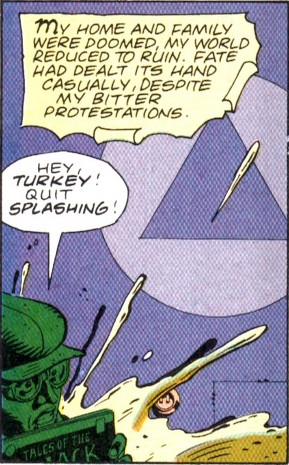 This cannot have been easy for Moore. Indeed, in the face of it one suspects his “bad mood” quip wasn’t just about minimizing the cultural impact of his begrudged magnum opus, but about minimizing the personal impact of it, playing down the sheer intensity of writing it. Moore has described the experience of writing, talking about how “if I’m writing, as I often do, something which requires messing around with the structure or vocabulary of the English language, then I find myself entering some very unusual mental spaces indeed. Writing the Lucia Joyce chapter of Jerusalem, ‘Round the Bend’, I found myself in a kind of synaptic cascade-state that had a delirious, mind-expanding bliss to it. By contrast, writing the collapsed future-vernacular of Crossed +100, I found myself ending up slightly depressed just by the experience of having a limited language with a subsequently limited number of things that the characters could think, or feel, or conceive of.” What, then, must steeping himself in the unrelenting and overwhelming temporal march towards doomsday that is Watchmen for the better part of a year have felt like?
This cannot have been easy for Moore. Indeed, in the face of it one suspects his “bad mood” quip wasn’t just about minimizing the cultural impact of his begrudged magnum opus, but about minimizing the personal impact of it, playing down the sheer intensity of writing it. Moore has described the experience of writing, talking about how “if I’m writing, as I often do, something which requires messing around with the structure or vocabulary of the English language, then I find myself entering some very unusual mental spaces indeed. Writing the Lucia Joyce chapter of Jerusalem, ‘Round the Bend’, I found myself in a kind of synaptic cascade-state that had a delirious, mind-expanding bliss to it. By contrast, writing the collapsed future-vernacular of Crossed +100, I found myself ending up slightly depressed just by the experience of having a limited language with a subsequently limited number of things that the characters could think, or feel, or conceive of.” What, then, must steeping himself in the unrelenting and overwhelming temporal march towards doomsday that is Watchmen for the better part of a year have felt like?
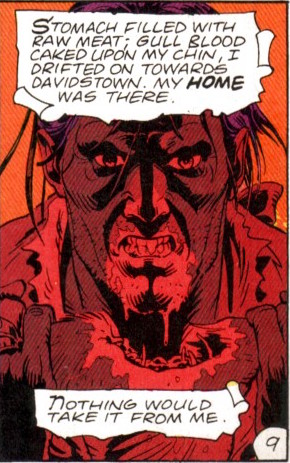 It is tempting to give a glib answer along the lines of “it must have felt like going mad.” This is mostly unfair, although it is impossible to completely forego the word when talking about someone who worships a puppet. But more than unfair, it is banal, falling into a rhetoric of equating artistic genius and mental illness that is at best tired and unenlightening and at worst crassly exploitative. That Watchmen succeeded is proof enough that Moore was not the only one for whom its claustrophobic eschatology appealed. It’s not paranoia if the world really is teetering on the brink of annihilation. Equally, it would be ridiculous to try to claim that Moore did not go further than most in exploring the apocalyptic tone of his times. It’s one thing to be drawn to a sense of stifling doom for the amount of time it takes to read Watchmen. It’s quite another to do so for the amount of time it takes to write one. That’s obsession; an obsession that goes beyond any easy explanation like Moore’s concern for his children. Loads of people had children in 1986 and were worried about their future in the face of nuclear weapons. Only one wrote Watchmen.
It is tempting to give a glib answer along the lines of “it must have felt like going mad.” This is mostly unfair, although it is impossible to completely forego the word when talking about someone who worships a puppet. But more than unfair, it is banal, falling into a rhetoric of equating artistic genius and mental illness that is at best tired and unenlightening and at worst crassly exploitative. That Watchmen succeeded is proof enough that Moore was not the only one for whom its claustrophobic eschatology appealed. It’s not paranoia if the world really is teetering on the brink of annihilation. Equally, it would be ridiculous to try to claim that Moore did not go further than most in exploring the apocalyptic tone of his times. It’s one thing to be drawn to a sense of stifling doom for the amount of time it takes to read Watchmen. It’s quite another to do so for the amount of time it takes to write one. That’s obsession; an obsession that goes beyond any easy explanation like Moore’s concern for his children. Loads of people had children in 1986 and were worried about their future in the face of nuclear weapons. Only one wrote Watchmen.
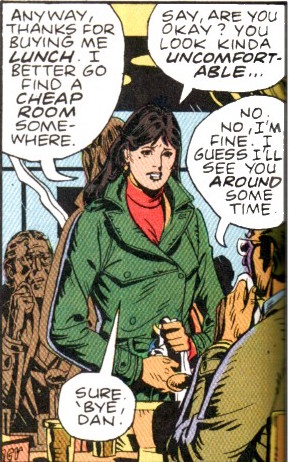 But the difference between “obsessive” and “crazy” is significant. The poison pen portrait can certainly be crafted. Moore’s propensity for feuds was accelerating rapidly, with him cutting ties with Alan Davis, DC, and IPC in fairly rapid succession. Add in some salacious gossip about his looming divorce and some selectively recounted stories of his increasing anxiety at the size of the crowds who came to see him at conventions and events and it’s easy to paint a portrait of a man so cracking under the strain of success that he was five years out from snake worship. Indeed, such portraits of Moore have become the norm in hindsight, particularly from within the American superhero comics industry that he was soon to shun. But it simply does not hold up. With the exception of his break with Alan Davis (a strong contender for the least sympathetic of his feuds, although notably one largely instigated by Davis), his feuds in this period are largely sound career moves that helped give Moore a career independent from any particular market. His looming divorce, though no doubt stressful for him (as was the attempt at a polyamorous marriage for a few years prior to it), has literally never been suggested by anyone familiar with the details to have been because he was “difficult” in any way. Indeed, the truth is that for all the widespread snark about Moore’s sanity, there has never been a point in his career in which he has seemed anything other than meticulous and aware of his actions. One need only look at Watchmen itself to see it. There exist numerous great works by people who can plausibly be described as “mad,” but the ornate precision of “Fearful Symmetry” is almost exactly unlike those works.
But the difference between “obsessive” and “crazy” is significant. The poison pen portrait can certainly be crafted. Moore’s propensity for feuds was accelerating rapidly, with him cutting ties with Alan Davis, DC, and IPC in fairly rapid succession. Add in some salacious gossip about his looming divorce and some selectively recounted stories of his increasing anxiety at the size of the crowds who came to see him at conventions and events and it’s easy to paint a portrait of a man so cracking under the strain of success that he was five years out from snake worship. Indeed, such portraits of Moore have become the norm in hindsight, particularly from within the American superhero comics industry that he was soon to shun. But it simply does not hold up. With the exception of his break with Alan Davis (a strong contender for the least sympathetic of his feuds, although notably one largely instigated by Davis), his feuds in this period are largely sound career moves that helped give Moore a career independent from any particular market. His looming divorce, though no doubt stressful for him (as was the attempt at a polyamorous marriage for a few years prior to it), has literally never been suggested by anyone familiar with the details to have been because he was “difficult” in any way. Indeed, the truth is that for all the widespread snark about Moore’s sanity, there has never been a point in his career in which he has seemed anything other than meticulous and aware of his actions. One need only look at Watchmen itself to see it. There exist numerous great works by people who can plausibly be described as “mad,” but the ornate precision of “Fearful Symmetry” is almost exactly unlike those works.
But if not madness, then what? The answer comes further in the quote about the experience of writing, when he says that “our entire neurological reality can be seen as being made from words at its most immediate level. When you descend into this level of our reality, the code of our reality if you like, then whether consciously or not; whether deliberately or not, you are working magic.” Moore wasn’t consciously or deliberately working magic yet in 1986, but it’s virtually inconceivable in hindsight that the mind-wrenching experience of writing Watchmen was not seminal in his doing so. (If nothing else, the two works most directly responsible for Moore’s eventual devotion to Glycon, Big Numbers and From Hell, are both fundamentally efforts to apply the techniques of Watchmen to new situations with new artists.) That was always the promise of Burroughs – that the continual, deliberate arrangement, rearrangement, and derangement of symbols would produce magical effects. In this regard, Moore fell into the classic trap for neophyte magicians: he got exactly what he asked for.
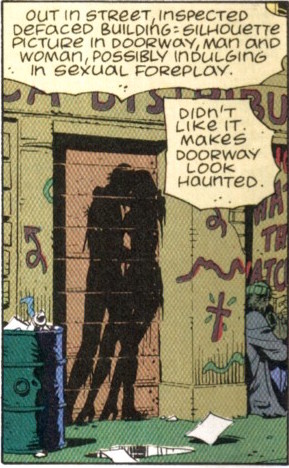 Of course he was neither the first nor last magus to wall himself into a labyrinth of his own construction. That’s not what’s remarkable about Watchmen and never has been. Rather, it is the paranoid, haunted quality of the labyrinth. Much of this came from the decision to use superheroes as the frame for his atomic eschatology. On the one hand this is an obvious link, as Grant Morrison observes at length in Supergods. On the other, however, it’s a slightly oblique one, based on something other than mere causality. Superheroes and atomic weapons emerged on opposite sides of World War II, their cultural legacies developing in parallel. There exist superheroes who are directly built out of the iconography of nuclear physics – most relevantly, Marvelman and Captain Atom – but the superhero is not “about” nuclear weapons any more than the atom bomb is “about” secret identities. And yet their parallel evolution creates its own symmetries. The superhero genre’s heyday coincides neatly with the most utopian visions of the atomic age, while the decline of the genre into something based more on faded and slightly shabby nostalgia similarly coincided with the turn towards a more nightmarish vision in the 1980s.
Of course he was neither the first nor last magus to wall himself into a labyrinth of his own construction. That’s not what’s remarkable about Watchmen and never has been. Rather, it is the paranoid, haunted quality of the labyrinth. Much of this came from the decision to use superheroes as the frame for his atomic eschatology. On the one hand this is an obvious link, as Grant Morrison observes at length in Supergods. On the other, however, it’s a slightly oblique one, based on something other than mere causality. Superheroes and atomic weapons emerged on opposite sides of World War II, their cultural legacies developing in parallel. There exist superheroes who are directly built out of the iconography of nuclear physics – most relevantly, Marvelman and Captain Atom – but the superhero is not “about” nuclear weapons any more than the atom bomb is “about” secret identities. And yet their parallel evolution creates its own symmetries. The superhero genre’s heyday coincides neatly with the most utopian visions of the atomic age, while the decline of the genre into something based more on faded and slightly shabby nostalgia similarly coincided with the turn towards a more nightmarish vision in the 1980s.
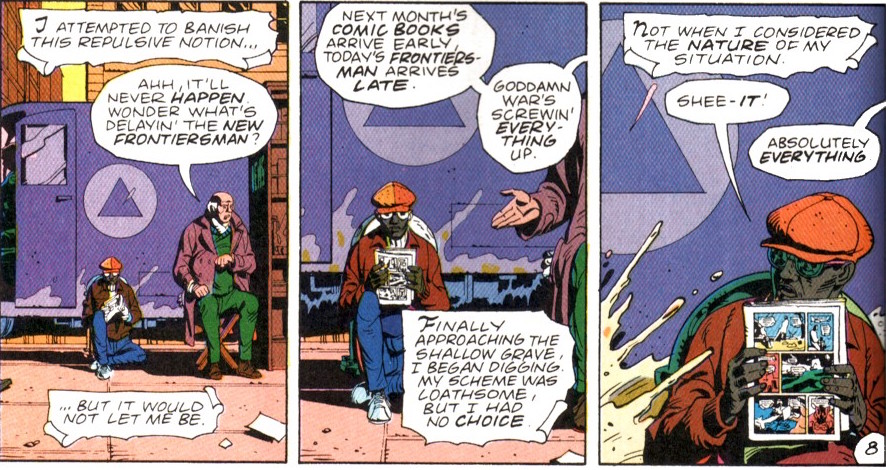 |
| Figure 949:Comics by the newsstand in Watchmen. (Written by Alan Moore, art by Dave Gibbons and John Higgins, from Watchmen #5, 1986) |
And so Moore’s construction of a detailed superhero history structured so as to lead inexorably towards a cataclysmic mid-80s end is strangely compelling. The idea of the cataclysmic ending of a superhero narrative had already been quasi-introduced in the form of Crisis on Infinite Earths, even if the actual ending part is ultimately eschewed. But more than that, the idea of the apocalyptic suits superheroes, a fact Moore had already heavily riffed on in his work on Captain Britain, Marvelman, and Superman, which is to say basically all of his pre-Watchmen superhero output. It is unmistakably what manichean stories of good and evil titans battling want to resolve into some sort of final battle, even if their serialization ultimately means this can never pay off, as with Crisis on Infinite Earths. But Moore’s idea of a superhero universe in decline was also a good fit for the times, with American comics having, by 1986, largely completed their transition from the mainstream availability of the newsstands (represented as a central part of Watchmen’s nostalgia) to the niche of the direct market. The industry had, simply put, seen better days, which was why the adult readership Moore successfully brought in with comics like Watchmen (and, to be fair, that people like Frank Miller brought in as well) mattered so much to the industry. And so Watchmen, by balancing a sense of decline and a sense of the apocalyptic, was perfectly poised for its time.
But the most chilling part of Moore’s labyrinth is not the sense of doom that hangs over it. Rather, it is his exploration of what, at first glance, would seem to be an innocuous, even optimistic line of thought. [continued]

April 1, 2016 @ 9:57 pm
Hey Phil,
Good stuff, as ever. A passing affinity struck me: Alan Moore and TS Eliot, with Watchmen and The Waste Land occupying a similar place in their respective progress.
At the most basic level, both these texts represented enormously influential cultural events, illuminating the new horizons to which their respective art forms could aspire and inspiring many, many imitators. In modern poetry, the question was how to proceed after The Waste Land. In superhero comics, the question was how to proceed after Watchemen. But the more interesting thing is the similarity in the reactions of the two writers to their works, Eliot to The Waste Land and Moore to Watchmen.
As you point out, Moore later describes Watchmen as the product of an entirely personal and subjective “bad mood” he was in at the time. There is the critique, implicit at first but becoming more insistent as the years go by, of a comics culture Moore sees as endlessly plaigarising his expression of this bad mood. There is the sense that in his dismissal of all further work in the superhero genre as wrong-headed and derivative, Moore sees himself as having ascended far above such simple and partial visions.
Eliot, in later years, dismissed suggestions that The Waste Land (published in 1922) had represented the ‘voice of a generation’. It was merely, he said now in his devout middle age, “the relief of a personal and wholly insignificant grouse against life…just a piece of rhythmical grumbling.”
The echo of Moore’s later public attitude to Watchmen is quite clear. Both works are dense and allusive, highly determined labyrinths, created by godlike invisible author who can’t resist giving you glimpses of their divine mechanics. Both are comfortless works, their ambiguous happy endings quickly falling apart to reveal the void.
Both men moved beyond these works, which neverthless remained their most influentual productions. And this fact was not an entirely pleasing one to either writer. Both Eliot and Moore, each according to his own lights, created a religion which personal meaning for them, using symbols and rituals bent to purpose (Glycon, the Kabbalah and general esoterica for Moore, an idealised version of the ‘Anglo-Catholic’ church for Eliot).
The hopeless chill of their most famous works – this was something they now sought to transcend, in both life and work.
So in Eliot’s dismissal of his poem, after years of watching young poets struggle to deal with its cultural vortex to create their own work, we sense the same implicit critique as Moore’s, of plaigarism, inauthenticy, repetition, etc.
Or am I talking crap?
April 1, 2016 @ 10:15 pm
Nah, I think that’s great.
April 2, 2016 @ 2:09 am
I lent Watchmen to a friend before 9/11. When she gave it back after 9/11, I felt a bit queasy.
May 15, 2016 @ 11:50 am
I have a weird childhood Cold war memory from around ’86 ish, must have been early to mid teens.
A sleepy Sunday south of Edinburgh and our whole estate was quiet. Out of nowhere a wailing sound of an air raid siren started crying whilst I was still in bed. It must have gone on for about a half hour. I remember lying in bed petrified, doing nothing, not knowing if was real or a dream but still wondering if the bombs were going to drop. I still don’t know if it was real, but at least the bombs did not fall – I know that much.
May 15, 2016 @ 11:51 am
Rats! I meant for this to be not a reply but my own comment. Ah well.
April 2, 2016 @ 6:52 pm
And with no Saturday Waffling, I’ll put my thoughts on the Last Tournament over here in the Last War post:
V/ Phonogram: V, even if part of me really wants to see Gillen in the final four. I think I’ve figured out why I don’t like Phonogram as much as the other Gillen/ McKelvie books, though: everybody in Phonogram reacts to a minor album track at roughly the same level I react to a particularly amazing live performance. I just don’t respond to music on the level the book does, and it keeps me from fully appreciating it. Don’t get me wrong, I enjoy Phonogram, but I’m far more admiring the craft than reacting to the story itself. (Oddly, I think I do react to comics the way the characters in Phonogram react to music- I can get blown away by a never reprinted throwaway story in a 10 cent book I grabbed from a dollar bin to scan for the DCM.)
Sandman/ All-Star Superman: All-Star Superman, but I would still be happy if Sandman wins. I think I’ve been avoiding voting for Sandman because it’s so important to me on a personal level, I know I can’t assess it rationally so I’m going for the competition. Not that All-Star Superman isn’t one of my all-time favorite books.
Watchmen/ From Hell: From Hell, just because I still don’t want Watchmen to win. It’s not that Watchmen isn’t great, it’s that a lot of other books are better; in no small part because they had the example of Watchmen to build off of.
American Gods/ The Doctor’s Wife: American Gods. Not that I don’t enjoy The Doctor’s Wife, but I’m convinced it’s only done as well as it has because it’s the only thing in the Non-Comics division that pretty much everybody has actually seen.
And, just to take this the rest of the way: in the semi-finals, whatever wins in American Superheroes has my vote over whatever wins British Classics. Literary vs. Non-Comics, American Gods beats Literary; Literary beats The Doctor’s Wife.
Which leaves finals: Unless the final battle is specifically Phonogram/ Watchmen (which I consider unlikely), whatever wins on the British/ American side wins overall.
April 3, 2016 @ 9:08 am
I take it that if we’re looking for a symmetrical structure in this chapter, the paragraph starting “But the difference between “obsessive” and “crazy” is significant” and more specifically the sentence “But it simply does not hold up” represents the “hinge” in the middle of that structure. Or am I just talking a bunch of errant pants?
April 4, 2016 @ 8:05 am
The hinge’s location is dictated by Watchmen.